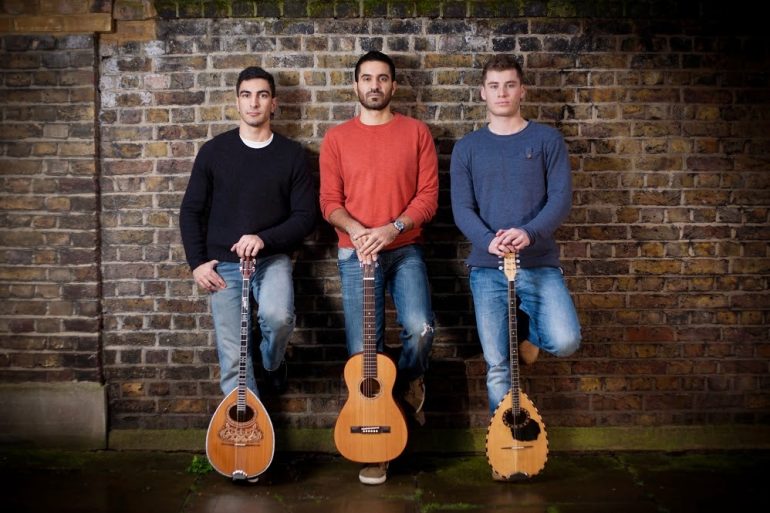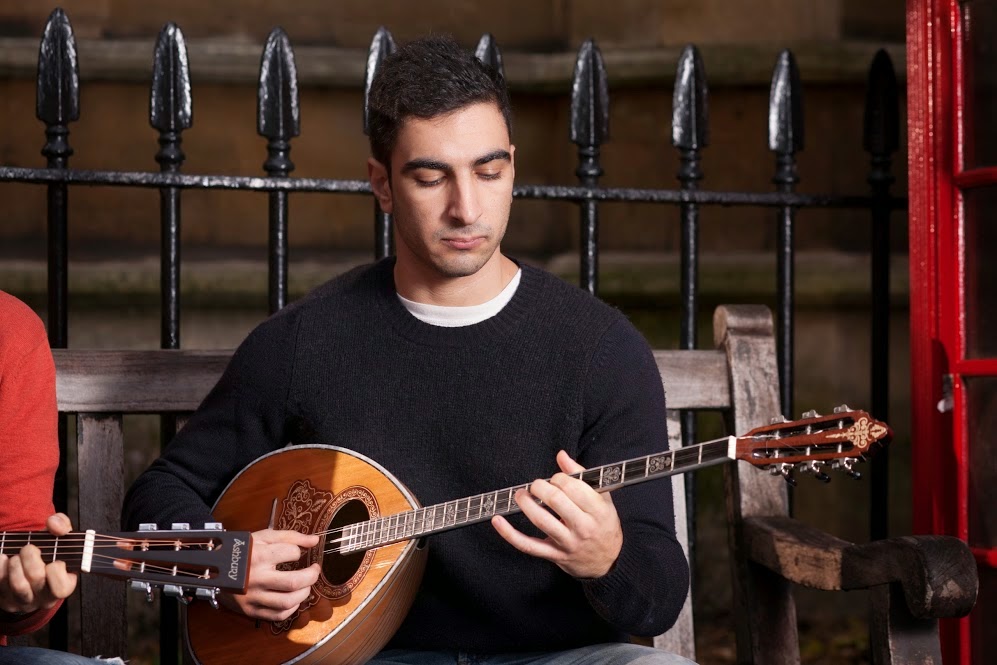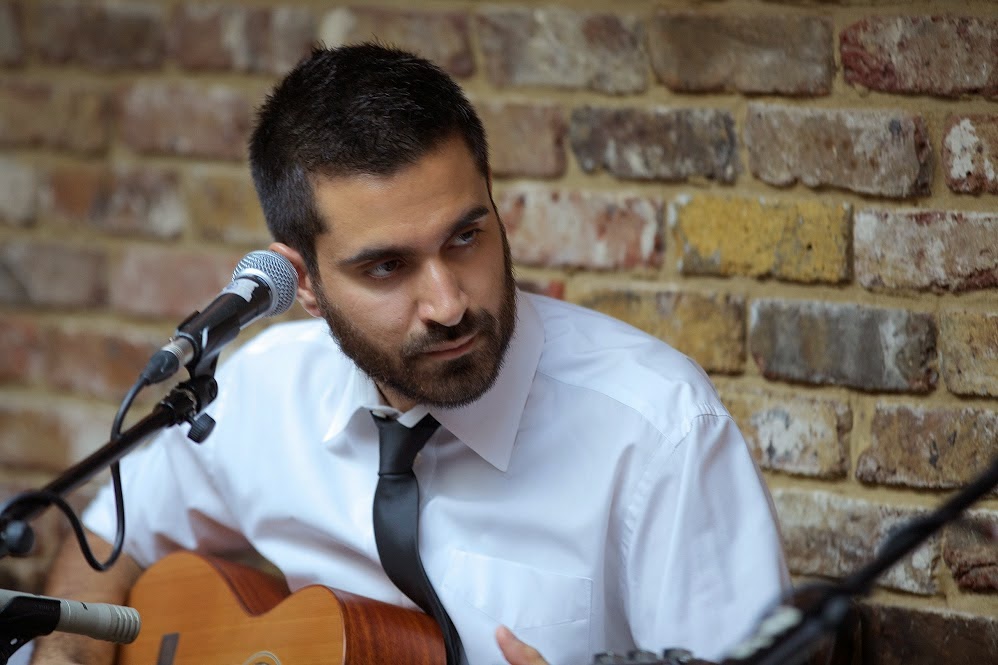Lovers of music, passionate about rebetiko. Three young people, from different locations, with different sounds, were found playing in London and performing Vamvakaris, Bayandera, Scarveli and others.
Iakovos, Symeon and Theodoulos declare themselves amateur musicians, precisely because they like what they do. They do not see it as a job, for them it is relaxation, it is a way of expression and communication. Simple and simple like the authentic rebetes, they work with emotion and, as it seems, they walk on beautiful paths…
(Read the interview in CITY newspaper):
Why rebetiko? What does this kind of music mean to you?
The relationship of each of us with rebetiko is personal and different. We like it because of its immediacy but also because it takes us to a time when we didn't live it. You walk to Piraeus, you see a sign "Hadjikyriakeio", you think of Bayandera and you start imagining the ones that the rebetes tell. But it also reminds you of a large part of the modern history of Greece - the refugee, the poverty, the misery, the dictatorship of Metaxas, the Occupation. Studying rebetiko ends up being a history lesson. Rebetiko is characterized by a pleasant austerity and immediacy compared to the chatter of today's music and the effort to impress, either with complex compositions or with too many skillful games, which in a long time just cause a yawn or a headache!
Studying rebetiko ends up being a history lesson.
Who are the Megla?
Symeon was born and raised in Nicosia and now works in London, where he studied. Theodoulos comes from Sotira, Famagusta, and is fresh in England, having just finished his studies in Thessaloniki and went up, while Iakovos was born and raised in Limassol and is currently pursuing a doctorate in London.
How did England come to be in your lives?
James came to study and is still a "hostage" of universities. Symeon also came for a degree and continues to do so, and Theodoulos climbed in September to begin his postgraduate studies.
The word megla is basically magi-argo, which means something very nice, and of good quality.
Your relationship with music?
Purely and strictly amateur. Theodoulos has been playing the bouzouki since he was a child and comes from a family that generally has the musical germ. Symeon is the multi-tool of the company since he plays bouzouki, lute and guitar, also from a young age, while Iakovos started with guitar in elementary school, then saxophone and recently with the three-string of rebetiko.
As the children say, Symeon has a special love for music at home. He likes to gather musicians and set up such nights. In one of them, Iakovos and Theodoulos met, they started playing for the company and having fun. They liked the result and said to continue it and make something more complete.
And what does the name of your band mean?
The word megla is basically magi-argo, which means something very nice, and of good quality. However, it is widespread enough to be included in both official Greek dictionaries. It is used today as an adjective, as a characteristic of an exquisite thing: "I bought a suit, megla", we say. One version of its origin is that it is a paraphrase of "Made in England" from which came the good suits of the interwar period (usually made of cashmere). The suggestion was made by a good friend and I think it was the most appropriate name for our band.
Two bouzoukis and a guitar are the main instruments of MEGLA. Sometimes, however, Theodoulos grabs the baglama, other times Symeon adds a second guitar and plays the "American rebetikas", as Iakovos puts it, who recorded them with guitars then - Kostis and Katsaros.
All three participate in the song, each has his own style and chooses to perform pieces that suit him. But various things happen on stage. Many times when one forgets lyrics, the other "saves" him, they change the program, they "steal" the pieces of each other. It's a nice game to have fun.
Music for them is a blessing, they say, a nice and creative way to unwind and communicate. Nobody sees it as a job, they just have a good time and wherever it goes. "We play to have a good time and then people, it's something we really enjoy."
Rebetiko, difficult and special listening. How was the acceptance in a country whose culture is not in line with this kind of music?
It is a genre that is respected by many people who listen to everything from stoner rock to art and folk. Many come to see us, who do not listen to rebetiko day and night at home, but have fun and have a good time.
As for acceptance, London is a patchwork of so many different people and situations that the difference is completely normal. We have several "foreigners" (that is, non-Greek speakers, because here, we are foreigners) who come to listen to us because they are interested in either ethnic or Greek music in general.
We would not say that the rebetiko went through apotheosis. Any kind of beliefs and pompous references do not fit the rebetiko temperament.
The rebetiko went through many stages. The outcry, the censorship, the acceptance and finally the apotheosis. The rebetes, through their music, judged and criticized, commented and narrated the hard daily life. They were the Alans of the time, the rebels who did not obey norms. Do you consider yourself a revolutionary?
As you said at the beginning the rebetes were marginalized with several problems with the police, mainly for theft and drugs. If you listen to "Heroin and blackness" by Gavalas, "Mes ton teke tis Marigos" by Peristeris or "To Sakaki" by Dellias, you will understand what was happening then. The censorship of rebetiko was also more musical than thematic. Lyrics may have been cut superficially, but Metaxas aimed more at cutting the oriental element from Greek music. He wanted the purification of Greek culture from foreign elements. Hence, he commissioned excellent musicologists of the time (Ioannis Psaroudas) to listen to the pieces, forcing many composers of the time to cut whatever they thought had an oriental influence or style in them. This led many rebetes (Tsaous, Papazoglou, Batis, Dellias) to virtually stop writing music after '37, and it was essentially a focal point for the evolution of Greek folk music after the Occupation and the civil war and consequently in what we have come to write it nowadays.
We would not say that the rebetiko went through apotheosis. Any kind of glories and pompous references don't fit the rebetiko temperament - he doesn't like the twelve-member orchestra, the piano and the double bass.
A revival and recognition began to live in post-war Greece, which became more intense today with the forced austerity that everyone applies in their lives. The immediacy and simplicity of rebetiko speaks to more people. Also, rebetiko, as a type of music, was never politicized like the later political song of the junta and the post-colonial era. Individually, some rebetes took their place (eg Bagianderas who also wrote a song for EAM) but as a musical genre he narrated exclusively the life of a specific caste of the working class of Piraeus and its surroundings, without a specific political ideology.
As for us, we do not consider ourselves revolutionaries. We do not play music to motivate something. Through music, we soften our soul a little and get away from our daily life a little. The fact that 50-60 people gather and share the trip with us is a great honor.
We don't like to rub anyone's face with the fact that we are dealing with something "alternative" while they prefer bouzouki. They choose and do well and support it.
Is the fact that you made a band that plays exclusively rebetiko, like a statement of disgust in the general system? Do you turn your back on what sells and sell what expresses you?
Look, it has become a habit in post-war Greece (and consequently in Cyprus as well) that anyone who plays something that goes beyond the purely commercial and trivial to stick a label of diversity and resistance to the established, etc.
To do something different from the masses does not mean that you do it purposefully and purposefully. Looking for something different that fills you is an inner need. We don't like to rub anyone's face with the fact that we are dealing with something "alternative" while they prefer bouzouki. They choose and do well and support it. The reason we deal with pre-war rebetiko is clearly because we like its style and aesthetics.
And the individual path of each of us towards rebetiko was quite different. We also deal with other types of music that are very different from each other. Symeon with the traditional of Greece and Cyprus, Theodoulos started with a purely folk repertoire in four-string bouzouki and spent years in the rebetos of Thessaloniki, while Iakovos discovered rebetiko in London between blues bars and metal concerts. In general, we tied to the fact that we all love rebetiko for our own reasons. No lurking expediency, no need for political expression.
I imagine most of your audience are Greeks and Cypriots living in England. Do you have locals in the audience?
London has a very remarkable scene in traditional and rebetiko music and very remarkable musicians (lute, bouzouki, violins, santouri, oud and nei). Last year in May there was a rebetiko festival which will take place again in 2016 and the above concerts were full. Also, there are at least 2-3 concerts a month. The Greeks generally embrace it, as do the Cypriots. It is also very nice to see older people, second generation immigrants, coming to our concerts with their English partners, not knowing Greek, but starting to ask for songs by Tsaous and Dellias! You can imagine how beautiful it feels. We also have many Englishmen. Many people are looking for new, strange for those instruments, unprecedented sounds and rhythms.
Anger and reaction are good when the knot reaches the scallop, but if our souls calm down a little collectively, they will not be needed either.
Where have you played so far? Is there a fixed space you appear in?
Mainly in small spaces in London of 50-60 people. Bar that deals with international music more, but we were invited to play even at a Christmas school charity bazaar in December!
We also happened to play in a Greek tavern. We don't have stable appearances but we try to play once or twice a month.
How do you plan to proceed?
As we said above, we are strictly amateurs. We love what we do, but it is and will remain our escape from everyday life. We don't have our own music. Rebetiko with the current conditions will hardly be rewritten even in Piraeus and Drapetsona, let alone between Bayswater and Camden.
We try to give her due honors to those we inherited. We have a friend who wants to record some shows for us, but I don't think you'll see the result in record stores!
As for the tour, we still have to get a group on the other side of the Atlantic. Now if we are invited to America or Australia to play, I don't think we will refuse, but we also agree with Germany / Sweden.
What is your opinion about the hearings of the average Cypriot today?
I don't think any of us like to judge another's choice of how he chooses to spend his time and how he will have fun. The three of us, for example, did not like all these mainstream sounds and we found others that touch us, as well as many people who are looking for it differently and not only in relation to music. Others read, others travel, others paint, others photograph and others just sit and philosophize about life with their loved ones. The important thing is for people to learn to externalize their sensitivities. Whether you call it differentiation or anything else, the point is to externalize that you have something beautiful inside you. Anger and reaction are good when the knot reaches the scallop, but if our souls calm down a little collectively, they will not be needed either.
What impresses them is that Cypriots in universities circulate in dozens and make a fuss!
They say that the crisis will do us good, it will "pop" us. Is this true or are they just consoling words?
We hope it makes us turn to the values we forgot. Tradition has a lot to teach us which we sacrificed on its altar of modernity. We named our heritage "village" and we are glad to be away from it. The fact that new kids are coming and asking us to play Cypriot songs is encouraging. The "suxe" are "Ai Giorgis" and "Triantaphylleni", may Alkinoos, who learned them in the world, be well.
What do foreigners say about Cyprus? Your peers from other countries you may be discussing, what do they tell you about us?
A few things. We are not the center of the world as much as we would like. What impresses them is that Cypriots in universities circulate in dozens and make a fuss! Also, the fact that we make a lot of friends with each other (we also declare ourselves guilty for this).
Are you optimistic about the future? Do they say how the cleansing started, do you agree or is it another mistake to disorient us once again?
We have disoriented ourselves. "Hey, I'm enlisting, yes, I'm selling, you were involved, yes, she was wearing it," our grandmothers used to say. If we open our eyes we will see a future. If we leave them closed we will see absolutely nothing.
The world that can find you if it wants to hear you? Will you come to Cyprus for some appearances?
We haven't set up a website yet, we have a Facebook page (facebook.com/MeglaBand) and a mailing list, which anyone who wants to know our news can send us to add it (meglaband@gmail.com). In Cyprus we played once in a cafe in Nicosia, at Christmas, we hope that all three of us will meet again and do it again. Stay tuned and we'll let you know or just bother in London!
Source: City Free Press





